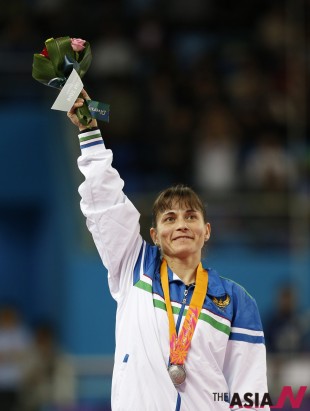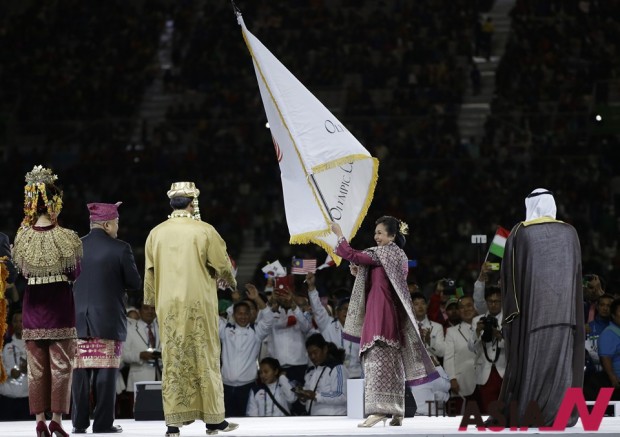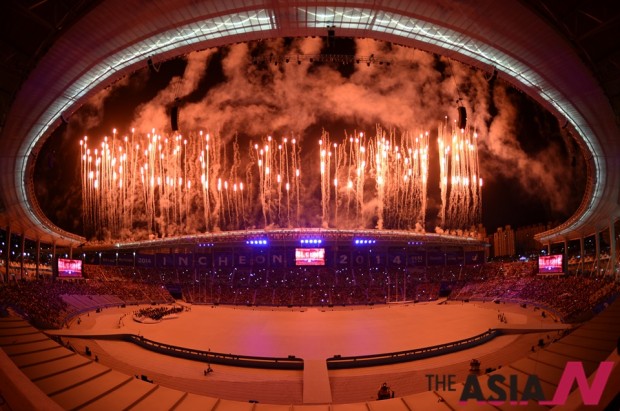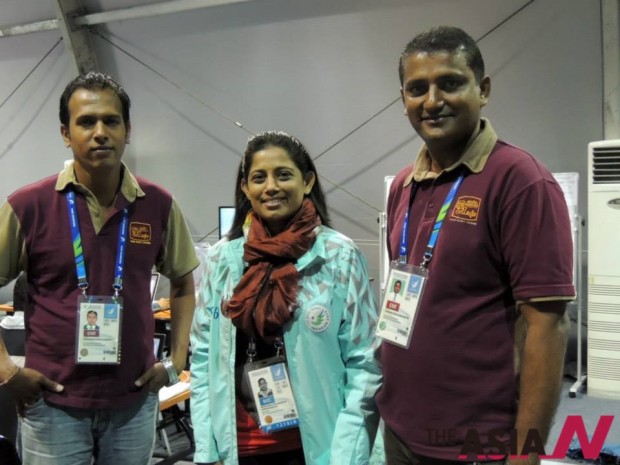[Transnational] Witnesses of the Incheon Asian Games
Returning to the Forgotten values of sports
Maria Mejia·Colombia·Graduate student of Global Sport Management at SNU
The 17th edition of the Asian Games represented for Korea not only the third opportunity to host the games, but also set questions within the sport world towards the readiness of a city to host such an event, and the preparations required by a country in order to be part of elite sport competition.
After Seoul (1986) and Busan (2002), in 2014, after seven years given to the preparations for the games, Incheon hosted an event that raised for the most part questions about logistics, the lack of budget, and lack of awareness of the previous local experiences hosting international sport events.
But Korea has proved to learn how to achieve economic development after being the host of mega-sport events. What was perceived by visitors in the city during the Incheon 2014 Asian Games was not only a lack of coordination between objectives of the city and the organizing committee, but also a very resourceful way to host an event of this kind, under a lower budget that would not compromise (for most part) the sustainability of the investment in the long run.
Venues that can be used by locals to practice a wide variety of sports, and the infrastructure that can diversify the portfolio of events that the city can offer among others, made me think of what I consider to be an “issue” that requires a second thought throughout the sport world. Mega-sport events have become a tool for countries to show how “powerful” they are, the more expensive, the “better,” and in the process, we all have forgotten that the games should not be about showing off economic power, but should represent the intrinsic values of sport, which includes the self-development of the people.
The second and third place nations in terms of the gold medal status of the games, Korea and Japan, do not reach the amount of medals of first-place China, with its 151 gold medals that make it by far the winner of the games. This should not only make us amazed at the experience and capability to produce wonderful athletes, but should also make us question the entire world about the need to balance the distribution of resources for sport development around the world.
While we get to see the amazing performances of athletes that challenge the limits of human kind, we also find unjust competition as most of the countries cannot afford the resources to equal the level of preparation of countries like China. But also, should they?
One of the aspects I would like to highlight the most about the Olympic concept of “Sport for All,” is the understanding of the practice of sport according to the Olympic Charter as a human right, and that guaranteeing human rights also goes along with the development of a nation.
But what is really development? Does it have to do with the capability of a country to invest most of its budget into sport competitions, to assure international recognition and a status upgrade? Or does it relate to a country that although is in a developing status of its economy, understands the need for its people to practice sport and be more active, which can help increase rates of good physical and mental health?

Silver medallist Uzbekistan’s Oksana Chusovitina during the medal ceremony for the gymnastics women’s vault final at the 17th Asian Games (Photo : AP/NEWSis)
Diversity Shines here indeed
Kamila Yuldasheva·Uzbekistan·Graduate student of Global Sport Management at SNU
The thought “diversity shines here indeed” resonated in my mind at the end of the opening ceremony for the 2014 Incheon Asian Games and the start of my two-week journey as an assistant for the National Olympic Committee (NOC) of Uzbekistan.
When it comes to diversity, the first place where you could see it upon arriving at the Athletes’ Village was the welcome center, the place where athletes and team officials activated their accreditation cards to enter the Village. It was a sort of small world with people from different Asian countries, so diverse and unique but at the same time unified by the power of sport.
I used to work for the NOC of Uzbekistan before coming to Korea and I was familiar with the Asian Games and issues related to this mega-sport event from the perspective of preparations. However, it was my dream to see the internal mechanisms of the Asian Games, which was responsible for the operations and running of the event.
I discovered various aspects of event management and work of the Organizing Committee departments. It was a great experience. Nonetheless, all my attention was captured by athletes, their motivation, excellence, performance, and perceptions of the Asian Games.
All of them were so committed to do their best and to win a medal for their respective country – sometimes overcoming pain and struggling with injuries. This is the invisible side of sport and victory for spectators.
Even though I was busy helping my NOC, I could manage to watch a few competitions. I was especially interested in artistic gymnastics and the performance of a special and legendary athlete of Uzbekistan, Oksana Chusovitina. She is a 39-year-old artistic gymnast, world and Olympic champion, and has competed in six Olympics and three Asian Games. Having taken silver in the vault in Incheon, she aims for the 2016 Rio Olympics.
The Asian Games are not only about the recording of medals. It is about the stories beyond the competitions and meaning of the awards and records – be it a first ever gold medal for a country as was the case for Cambodia or a world record by a North Korean athlete.
Everyone was so excited to perform at the Asian Games and you could feel this in the air, especially at the competition venues where spectators supported the athletes. For me, it was a pleasure to see how athletes and coaches from North Korea wore their national outfits and came as a big team to every single competition where their country was participating to support their athletes.
The 17th Asian Games might not be perfect from an organizational point of view, but overall, this event has been considered a success, as it brought regional unity, harmony and friendship. Various sports, great events and performances of the outstanding athletes are already history. And we are its witnesses.
Fostering friendship through sport
M.K.A. Anoma Rathnayaka·Sri Lanka·Graduate student of Global Sport Management at SNU
I was lucky enough to experience one of the biggest mega events of sport after the Olympics. I was working as an NOC Attaché for Sri Lanka and as a reporter representing Sri Lanka for the IAG CREW at the 17th Asian Games held in Incheon, South Korea. The games left me with ample and unforgettable memories.
When I first came to Korea, what instantly took me by surprise was how amiable and hospitable Koreans were. During the games, I had an unforgettable memory on my way to Incheon, as I came across many Koreans who were always more than willing to help me. On the subway, one lady willingly helped me carry my bag. I was very touched by her kindness. I thought she was Korean, but she was from the USA. After some conversation, we became friends. I felt this was one essence of sport – friendship. Many people think sport is about winning medals. But I realized that sharing and caring is one of the biggest values a sport event can bring around the world as well as happiness and fostering respect of other cultures.
This was my first time working at an Asian Games. From my experience, I gathered that it takes a lot of conscientiousness to be a coordinator and a sport writer. I learned that paying attention to details and doing research in advance is one thing, but putting passion into every article is another thing, as fatigue sometimes takes over enthusiasm. Learning how to tactfully word the smartest questions as well as how to politely approach interviewees helped me to improve my social skills and critical thinking. As I a reporter, I interviewed the Secretary General and the academic director of the NOC of Sri Lanka and some Sri Lankan beach volleyball athletes. I was also able to cover a live cricket match for the first time. One memorable experience was writing and publishing an article about the activities of the Sri Lankan media during the Asian Games, which was a rare experience for the media. I was also able to make new friends from Sri Lanka and various Asian countries as well, whom by all means I will remain in touch with.
The Incheon Asian Games in general as well as my role as an NOC attaché and IAGOC CREW writer in particular was a unique experience that I felt endlessly fortunate to have experienced as a part of my journey. This opportunity left me with lasting impressions, which will always be gleeful and remarkable when I look back on my more than three-week express journey at Incheon.

President of Olympic Council of Asia Sheikh Ahmad Al Fahad Al Sabah, right, watches Rita Subowo, President of the National Olympic Committee of Indonesia, wave the Olympic Council of Asia flag during the closing ceremony for the 17th Asian Games in Incheon, South Korea, Saturday, Oct. 4, 2014. (Photo : AP/NEWSis)
Passing the baton to Indonesia
Lie Wiena Octaria·Indonesia·Graduate student of Global Sport Management at SNU
For an Indonesian, the Asian Games is like an Olympic Games with less participating countries. In almost all sports that we participated in, there would be China, Japan, South Korea or others and the combination of all four would be a nightmare for us, as we tried to at least make it to the semifinals. Even so, I always enjoy watching the Asian Games; this is one of the ways in which I decide which Asian athletes I will cheer for at the Olympic Games.
There was something different at the 17th Incheon Asian Games 2014. For these games, I was on a different end of the games. Usually, I am at the participating end, as I work for Komite Olimpiade Indonesia, but this year, I was a volunteer. It was a completely different and valuable experience seeing everything from the opposite point of view and gave me a wider understanding and perspective of the games.
These games also had a special meaning for me since Indonesia will host the next games. When the news broke that Vietnam resigned as the 18th Asian Games host and Indonesia was more than willing to host, my instant reaction was “What?…” The host city contract was signed at the 33rd OCA General Assembly on September 20, in front of other NOCs’ representatives.
During the Games, witnessing first hand what to do, who would do it and how made me think whether Indonesia is truly ready to host the Asian Games. Having South Korea as the host of the previous Games does not put Indonesia in a good position, as people tend to compare the Games with the previous host.
Closing ceremonies never interest me. They are less serious and more like a celebration than a ceremony. But, this time was different. I attended the closing ceremony, sat at my assigned seat and actually enjoyed it. When the time came for the spectators to be asked to stand up because the Indonesian flag was going to be hoisted up, followed by our national anthem, I somehow felt proud.
The overwhelming feeling continued to flow when Mrs. Subowo, NOC President of Indonesia, accompanied by Mr. Basuki Tjahaja Purnama, the vice governor of Jakarta, and Mr. Alex Noerdin, the governor of South Sumatra, stood up for the OCA flag handover procession.
Then a video about Jakarta and Palembang was shown and it ended with the inscription, “Welcome to the 18th Asian Games, Indonesia.” Seeing that written on a big screen in front of 60,000 spectators at the main stadium in Incheon, South Korea gave me goose bumps and flooded me with extreme pride. Suddenly the cold and windy stadium and the thought of the long journey back to the hotel did not bother me at all. I walked out from the stadium with my colleagues and said, “You know what? I think we can do it.”





























































